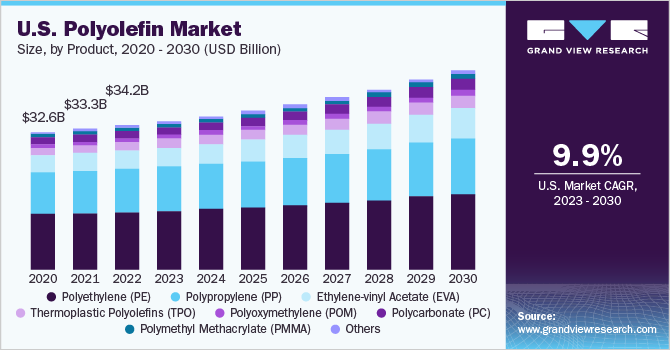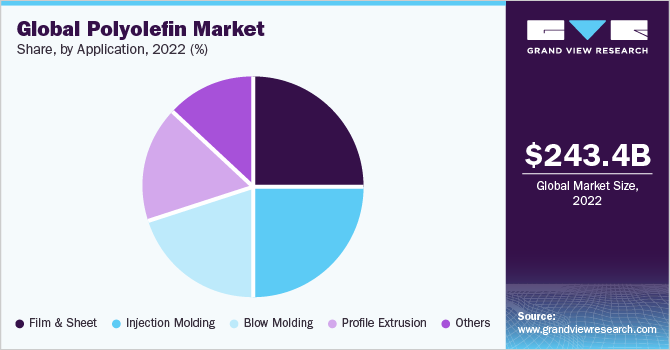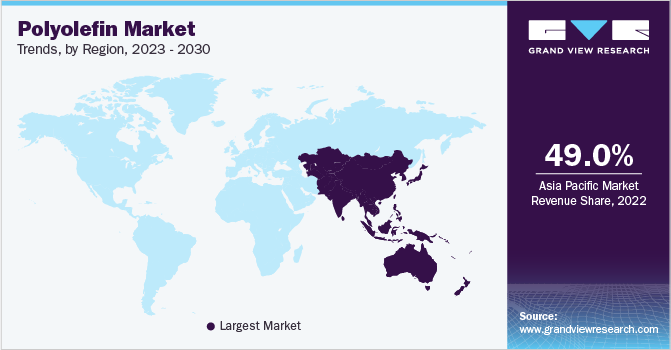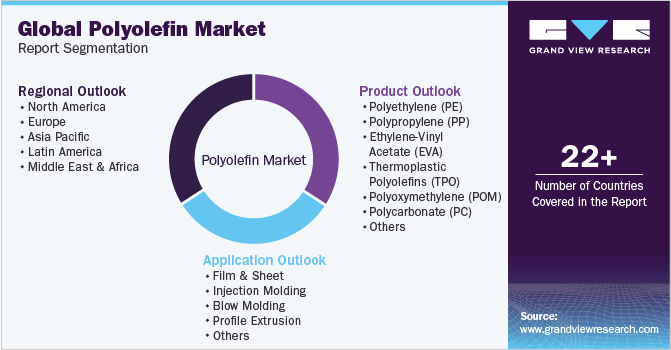- Home
- »
- Plastics, Polymers & Resins
- »
-
Polyolefin Market Size, Share, Growth Analysis Report, 2030GVR Report cover
![Polyolefin Market Size, Share & Trends Report]()
Polyolefin Market Size, Share & Trends Analysis Report By Product (Polyethylene, Polypropylene, Polycarbonate), By Application (Film & Sheet, Injection Molding, Blow Molding), By Region, And Segment Forecasts, 2023 - 2033
- Report ID: GVR-2-68038-091-0
- Number of Report Pages: 129
- Format: PDF, Horizon Databook
- Historical Range: 2018 - 2021
- Forecast Period: 2023 - 2030
- Industry: Bulk Chemicals
Report Overview
The global polyolefin market size was valued at USD 243.41 billion in 2022 and is expected to expand at a compound annual growth rate (CAGR) of 5.1% from 2023 to 2030. The market is poised for growth due to increasing adaptation across the end-use industries. The use of polyolefins in automotive applications helps reduce fuel consumption on account of their ability to reduce the density and weight of vehicles compared to conventional materials such as rubber and metal. Increasing awareness regarding health hazards and consumer safety in various industries, such as electronics, healthcare, wire & cable, construction, and automotive, is expected to drive the global market over the forecast period. The rapidly developing automotive industry is expected to trigger the demand for plastics in under-the-hood components as well as exteriors & interiors of automobiles. Polyolefins are majorly used in under-the-hood components in the automotive industry.

The demand for polyolefins such as polyethylene, polypropylene, ethylene-vinyl acetate, and thermoplastics is expected to grow in the U.S. from 2023 to 2030. This is due to the surging usage of medical masks, gloves, shoe & head covers, and gowns owing to rising health awareness among the masses and their increasing focus on hygiene and infection prevention.
The proposed USD 2 trillion investment of the Federal Government of the U.S. in a 10-year infrastructure development plan is poised to capitalize on the low-risk environment, stable economy, and strong financial sector of the country. These favorable conditions have already attracted significant investor interest, fostering a conducive atmosphere for surged infrastructure expenditure and development in the U.S. This, in turn, is projected to positively impact the demand for polyolefins from the construction industry of the country.
Thermoplastic polyolefins segment of the market in the U.S. is projected to grow at a significant rate during the forecast period owing to an exceptional combination of durability, weather resistance, easy process ability, and versatility which refers to their ability to be molded and reshaped when heated, and solidify when cooled, without undergoing significant chemical change offered by them. This makes thermoplastic polyolefins highly sought-after materials in the U.S. for use in the automotive, construction, and consumer goods industries.
Product Insights
The polyethylene (PE) led the market for polyolefin market across the product segmentation and accounted for a revenue share of over 38.0% in 2022. Polyethylene has witnessed significant growth in recent years with an increase in utilization across prototype development on 3D printers and CNC machines.
Furthermore, driven by the upsurge in industrialization, China, India, and Japan have emerged as prominent countries in the polyethylene market across the Asia Pacific (APAC) region. The expansion of the construction and furniture sectors, along with the presence of major automotive industries and increasing demand for sophisticated infrastructure, have emerged as pivotal catalysts propelling the polyethylene industry in the Asia Pacific.
Followed by polyethylene, polypropylene witnessed a market revenue share above 28.0%. Polypropylene can be easily manufactured into a living hinge, which are extremely thin plastics that can be bent without breaking. Although polypropylene is not particularly used in structural applications, it finds its major usage in applications such as bottling of certain edible products or even liquid soaps, shampoos, and more.
Ethylene vinyl acetate (EVA) is a redispersible polymer that is available in the form of a free-flowing powder. It shares resemblances with low-density polyethylene, showcasing heightened gloss, softness, and flexibility. These polyolefins exhibit excellent performance under low temperatures and are commonly employed as hot-melt adhesives, finding widespread application in products like soccer cleats and plastic wraps. Furthermore, EVA extends its utility to biomedical engineering, serving as a parts and component of drug delivery device in various healthcare applications.
Application Insights
The film & sheet led the market for market across the application segmentation and accounted for a revenue share of over 25.0% in 2022. Polyolefins provide high-quality shrink films with improved clarity and appearance for the consumer goods industry. Polyolefins have stronger puncture resistance, are FDA approved, have no chlorine content, and are more durable; however, they are relatively more expensive.
Due to increased use in the packaging business, Asia Pacific (APAC) is one of the significant markets for polyolefin, which includes both edible and non-edible goods. Rising disposable income and living standards in China, India, Japan, Malaysia, Indonesia, and Thailand will support industry expansion throughout the forecast period. However, the European market has significant potential due to high demand for polyolefins in the furniture and interior industries.

Growing emphasis on sustainability and progressive efforts to reduce carbon footprint by various consumer electronics manufacturers have augmented the demand for post-consumer recycled plastic resins in recent years. Laptop manufacturers such as Lenovo manufactures notebooks, desktops, workstation, monitors, and other accessories using post-consumer recycled plastic resins. This increasing adoption of post-consumer recycled plastic resins is expected to continue over the forecast period.
Injection molding is used for producing custom polyolefin materials. As polyolefin parts are made in molds and must be cooled before removal, the process is discontinuous. Injection molding necessitates the use of a machine, plastic materials, and molds. To make the final product, molten plastic is pumped into the mold cavity and cooled. It is commonly used in the production of automobile parts, medical devices, containers, and others.
Growing demand for polyolefin injection molding from a variety of end-use sectors, combined with increased manufacturer awareness about the benefits of polyolefin injection molding, is expected to fuel the demand for polyolefin injection molding. Heat and pressure-resistant materials are becoming increasingly popular as infrastructure development accelerates in countries such as Brazil and India. This is likely to increase the use of polyolefin injection molding by manufacturers of building products.
Regional Insights
Asia Pacific dominated the market and accounted for a revenue share of over 49.0% in 2022. The Asia Pacific region stands out for its abundance of skilled labor available at a low cost, as well as easily accessible land. This shift in production focus toward emerging economies, particularly China and India, is poised to have a positive impact on market growth throughout the forecast period. The region is a major hub for rapidly expanding industries like construction, automotive, and electronics, offering significant potential for polyolefin manufacturers.

Despite slower growth in well-established regions like North America and Europe, many countries in Asia Pacific are projected to witness robust economic expansion over the forecast period. Government initiatives aimed at bolstering domestic manufacturing are expected to amplify regional production and reduce dependency on imports, creating enticing prospects for industrial manufacturers and polyolefin producers alike.
Continuing infrastructural investments are expected to sustain economic growth in China and the automotive, aerospace, and construction sectors are expected to benefit from reforms include regulatory changes, policy adjustments, or structural enhancements. However, these prospects are not long-term and growth is likely to remain sluggish in the industrial sector, which is likely to impact the consumption of polyolefin over the forecast period.
The polyolefin market in Europe is likely to witness sluggish growth owing to various factors, such as stalled industrial output caused by economic uncertainties, supply chain disruptions, and regulatory changes, which have collectively impacted market dynamics and expansion. Nevertheless, a promising outlook in Eastern Europe, driven by robust consumerism and manufacturing, is poised to stimulate the growth of the polyolefin market.
Despite presenting challenges for growth, these regulatory policies are anticipated to foster industrial development by compelling manufacturers to streamline their processes, innovate in the area of sustainable technologies, and create environmental friendly products. This push toward compliance can lead to a more resilient and forward-looking industry that contributes to both economic and environmental sustainability.
Key Companies & Market Share Insights
In the Polyolefin Market, major players have adopted various strategic initiatives such as new product launch, production expansion, merger & acquisition, and others. These strategic initiatives enable the market players to maintain the competitive environment and meet global demand. For instance, in May 2023, Borealis, an advanced & circular polyolefin solution provider launched Stelora to its existing portfolio of polyolefins. This sustainable engineering polymer provides attributes such as strength, durability, and higher thermal resistance. Research activities focused on new materials, which combine several properties, are projected to gain wide acceptance in this industry in the coming years. Some of the key players in the global polyolefin market are:
-
China Petrochemical Corporation
-
LyondellBasell Industries Holdings B.V.
-
PetroChina Company Limited
-
TotalEnergies
-
Chevron Corporation
-
Repsol
-
Dow, Inc.
-
Exxon Mobil Corporation
-
Braskem
-
Borealis AG
Polyolefin Market Report Scope
Report Attribute
Details
Market size value in 2023
USD 252.5 billion
Revenue forecast in 2030
USD 357.3 billion
Growth rate
CAGR of 5.1% from 2023 to 2030
Base year for estimation
2022
Historical data
2018 - 2021
Forecast period
2023 - 2030
Report updated
September 2023
Quantitative units
Volume in kilotons; revenue in USD million, and CAGR from 2023 to 2030
Report coverage
Revenue and volume forecast, company profiles, competitive landscape, growth factors, and trends
Segments covered
Product, application, region
Region scope
North America, Europe, Asia Pacific, Central & South America, Middle East & Africa
Country scope
U.S.; Canada; Mexico; Germany; U.K.; Italy; France; Spain; China; India; Japan; South Korea; Australia; Brazil; Argentina; South Africa; Saudi Arabia
Key companies profiled
China Petrochemical Corporation; LyondellBasell Industries Holdings B.V.; PetroChina Company Limited; TotalEnergies; Chevron Corporation; Repsol; Dow, Inc.; Exxon Mobil Corporation; Braskem; Borealis AG
Customization scope
Free report customization (equivalent up to 8 analyst’s working days) with purchase. Addition or alteration to country, regional, and segment scope.
Pricing and purchase options
Avail customized purchase options to meet your exact research needs. Explore purchase options
Global Polyolefin Market Report Segmentation
This report forecasts revenue and volume growth at global, regional & country levels and provides an analysis of the industry trends in each of the sub-segments from 2023 to 2033. For this study, Grand View Research has segmented the polyolefin market report on the basis of product, application, and regions:

-
Product Outlook (Volume, Kilotons; Revenue, USD Million, 2018 - 2030)
-
Polyethylene (PE)
-
Polypropylene (PP)
-
Ethylene-Vinyl Acetate (EVA)
-
Thermoplastic Polyolefins (TPO)
-
Polyoxymethylene (POM)
-
Polycarbonate (PC)
-
Polymethyl Methacrylate (PMMA)
-
Others
-
-
Application Outlook (Volume, Kilotons; Revenue, USD Million, 2018 - 2030)
-
Film & Sheet
-
Injection Molding
-
Blow Molding
-
Profile Extrusion
-
Others
-
-
Regional Outlook (Volume, Tons; Revenue, USD Million, 2018 - 2030)
-
North America
-
U.S.
-
Canada
-
Mexico
-
-
Europe
-
Germany
-
UK
-
Italy
-
France
-
Spain
-
-
Asia Pacific
-
China
-
India
-
Japan
-
South Korea
-
Australia
-
-
Central & South America
-
Brazil
-
Argentina
-
-
Middle East & Africa
-
South Africa
-
Saudi Arabia
-
-
Frequently Asked Questions About This Report
b. The global polyolefin market size was estimated at USD 243.41 billion in 2022 and is expected to reach USD 252.5 billion in 2023.
b. The global polyolefin market is expected to grow at a compound annual growth rate of 5.1% from 2023 to 2030 to reach USD 357.3 billion by 2030.
b. Film & sheet segment dominated the polyolefin market with a share of 25.0% in 2022. Polyolefin is diversely applied in food packaging, blown film bags, industrial thermoforming, and more.
b. Some key players operating in the polyolefin market include Sinopec Corporations, LyondellBasell Industries Holdings N.V., ExxonMobil Chemicals, and Petrochina Company Limited.
b. Key factors that are driving the polyolefin market growth include rising innovation in plastic technologies, the advent of cheap interior furnishings in automobiles, and strict industrial standards concerning carbon emissions.
Share this report with your colleague or friend.
![gvr icn]()
NEED A CUSTOM REPORT?
We can customize every report - free of charge - including purchasing stand-alone sections or country-level reports, as well as offer affordable discounts for start-ups & universities. Contact us now
![Certified Icon]()
We are GDPR and CCPA compliant! Your transaction & personal information is safe and secure. For more details, please read our privacy policy.
We are committed towards customer satisfaction, and quality service.
"The quality of research they have done for us has been excellent."





